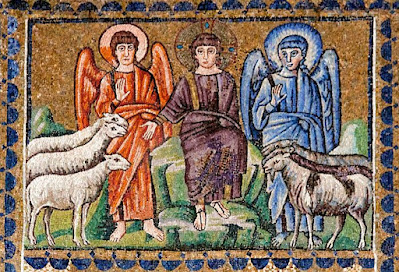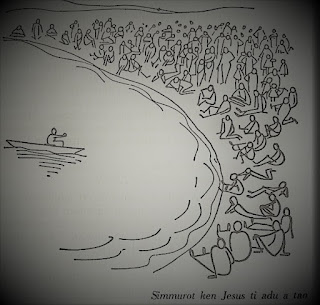The Waiting Time: Matthew's Eschatological Discourse
 |
| Last Judgment: 6th-century Tapestry (Ravenna, Italy) |
For the Solemnity of Christ the King (11/22/2020), the Gospel reading comes from the Eschatological Discourse of Matthew (The Parable of the Final Judgment). The following short reflection was written in 2008 by the late Fr. Willy Villegas, SVD. He was a professor of the New Testament and Greek for many years at the Divine Word Seminary, Tagaytay City. He died on November 15, 2015 (a Sunday before the feast of Christ the King).
This Gospel is part of the eschatological discourse (Mattew 24-25) which presents the Matthean doctrine on the Last Days.
Eschatology (doctrine on the Last Days) teaches that the return of Christ at the end of time is certain. Uncertain is the time when Jesus returns. The early Christians thought that the Lord Jesus would return in their lifetime, within their generation. When the apostles died and Jesus did not return, the teaching on eschatology had to be revised (cf. Second Peter).
The Matthean eschatological discourse is one such revision: the certainty of the Lord’s Parousia is maintained. The problem is the interim period, the waiting period of everyday Christian living.
The answer is the attitude of vigilance and constant waiting because the Lord can return anytime. Matthew expounds on the attitude of vigilance in seven parables. The last four parables are the more important: the Parable of the Prudent Servant teaches ready vigilance – to be always ready to open when the Lord returns; the Parable of the Ten Virgins teaches loving vigilance – to keep our lamps burning; the Parable of the Ten Talents teaches effective vigilance. The final parable, the Parable of the Last Judgment, teaches us to accept that the Lord is always present in “the least of His brethren.”
To quote John P. Meier: “What does it mean to be watchful (Prudent Servant) and ready (Ten Virgins) and faithful (Talents)? To be watchful means to be able to recognize the Son of Man in these people; to be faithful means to translate this love into active service, into concrete deeds of mercy. This is the criterion by which one enters into or is rejected from eternal life.”
In brief, the Lord is sure to return (Parousia), but there is no need to worry about His return, as long as we truly serve Him, already now, in “the least of His brethren.”


Comments
Post a Comment